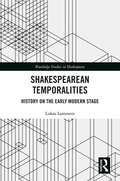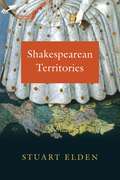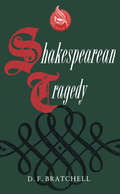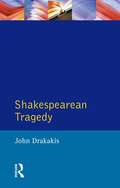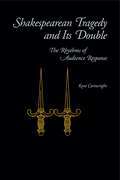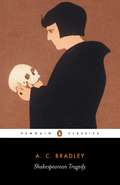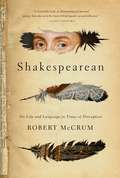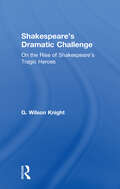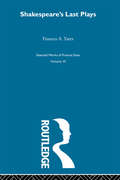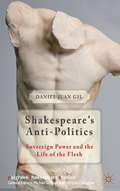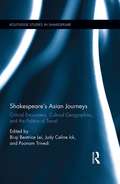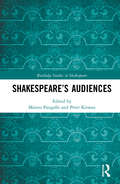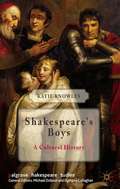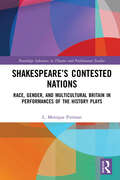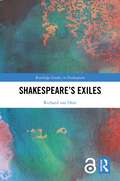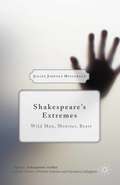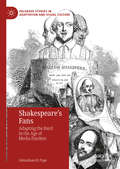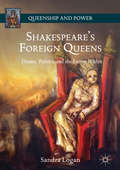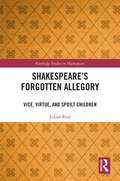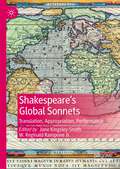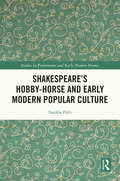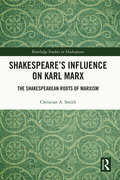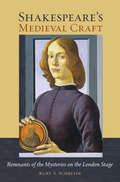- Table View
- List View
Shakespearean Temporalities: History on the Early Modern Stage (Routledge Studies in Shakespeare)
by Lukas LammersShakespearean Temporalities addresses a critical neglect in Early Modern Performance and Shakespeare Studies, revising widely prevailing and long-standing assumptions about the performance and reception of history on the early modern stage. Demonstrating that theatre, at the turn of the seventeenth century, thrived on an intense fascination with perceived tensions between (medieval) past and (early modern) present, this volume uncovers a dimension of historical drama that has been largely neglected due to a strong focus on nationhood and a predilection for ‘topical’ readings. It moreover reassesses genre conventions by venturing beyond the threshold of the supposed "death of the history play," in 1603. Closely analysing a broad range of Shakespeare’s historical drama, it explores the dramatic techniques that allow the theatre to perform historical distance. An experience of historical contingency through an immersion in a world ontologically related yet temporally removed is thus revealed as a major appeal of historical drama and a striking aspect of Shakespeare’s history plays. With a focus on performance, the experience of playgoers, and the dynamics that resulted from the collective production of dramatic historiography by competing companies, the book offers the first analysis of what can be referred to as Shakespeare’s dramaturgy of historical temporality.
Shakespearean Territories
by Stuart EldenShakespeare was an astute observer of contemporary life, culture, and politics. The emerging practice of territory as a political concept and technology did not elude his attention. In Shakespearean Territories, Stuart Elden reveals just how much Shakespeare’s unique historical position and political understanding can teach us about territory. Shakespeare dramatized a world of technological advances in measuring, navigation, cartography, and surveying, and his plays open up important ways of thinking about strategy, economy, the law, and colonialism, providing critical insight into a significant juncture in history. Shakespeare’s plays explore many territorial themes: from the division of the kingdom in King Lear, to the relations among Denmark, Norway, and Poland in Hamlet, to questions of disputed land and the politics of banishment in Richard II. Elden traces how Shakespeare developed a nuanced understanding of the complicated concept and practice of territory and, more broadly, the political-geographical relations between people, power, and place. A meticulously researched study of over a dozen classic plays, Shakespearean Territories will provide new insights for geographers, political theorists, and Shakespearean scholars alike.
Shakespearean Tragedy
by D. F. BratchellThis volume reflects changing critical perceptions of Shakespeare's works from Renaissance to modern times and celebrates the power of Shakespearean tragedy. The selection of critical reaction covers both the general concept of Shakespearean tragedy and its expression in the major plays, illustrating the main directions of critical approaches to Shakespearean tragedy and enabling the reader to develop an informed response to Shakespeare's dramatic works. An introductory chapter traces the development of the concept of tragedy from classical times, and its dramatic expression in the time of Shakespeare. Each of Shakespeare's great tragedies - Hamlet, Macbeth, Lear, and Othello - is considered in turn, and a final chapter summarizes contemporary critical approaches so that the reader can link the best of the critical past with the present critical scene.
Shakespearean Tragedy (Longman Critical Readers)
by John DrakakisShakespearean Tragedy brings together fifteen major contemporary essays on individual plays and the genre as a whole. Each piece has been carefully chosen as a key intervention in its own right and as a representative of an influential critical approach to the genre. The collection as a whole, therefore, provides both a guide and explanation to the various ways in which contemporary criticism has determined our understanding of the tragedies, and the opportunity for assessing the wider issues such criticism raises.The collection begins by considering the impact of social semiotics on approaches to the tragedies, before moving on to deal, in turn, with the various forms of Marxist criticism, New Historicism, Cultural Materialism, Feminism, Psychoanalysis, and Poststructuralism.
Shakespearean Tragedy and Its Double: The Rhythms of Audience Response (G - Reference, Information and Interdisciplinary Subjects)
by Kent CartwrightWhy does Shakespearean tragedy continue to move spectators even though Elizabethan philosophical assumptions have faded from belief? Shakespearean Tragedy and Its Double seeks answers in the moment-by-moment dynamics of performance and response, and the Shakespearean text signals those possibilities.Shakespearean Tragedy and Its Double investigates the poetics of audience response. Approaching tragedy through the rhythms of spectatorial engagement and detachment ("aesthetic distance"), Kent Cartwright provides a performance-oriented and phenomenological perspective. Shakespearean Tragedy and Its Double analyzes the development of the tragic audience as it oscillates between engagement—an immersion in narrative, character, and physical action—and detachment—a consciousness of its own comparative judgments, its doubts, and of acting and theatricality. Cartwright contends that the spectator emerges as a character implied and acted upon by the play. He supports his theory with close readings of individual plays from the perspective of a particular element of spectatorial response: the carnivalesque qualities of Romeo and Juliet; the rhythm of similitude, displacement, and wonder in the audience's relationships to Hamlet; aesthetic distance as scenic structure in Othello; the influence of secondary characters and ensemble acting on the Quarto King Lear; and spectatorship as action itself in Antony and Cleopatra.Shakespearean Tragedy and Its Double treats the dramatic moment in Shakespearean tragedy as uncommonly charged, various, indeterminate, always negotiating unpredictably between the necessary and the spontaneous. Cartwright argues that, for the audience, the very dynamism of tragedy confers a certain enfranchisement, and the spectator's experience emerges as analogous to, though different from, that of the protagonist. Through its own engagement and detachments the audience becomes the final performer creating the play's meaning.
Shakespearean Tragedy: Lectures On Hamlet Othello King Lear Macbeth
by John Bayley A. BradleyA.C. Bradley put Shakespeare on the map for generations of readers and students for whom the plays might not otherwise have become "real" at all' writes John Bayley in his foreword to this edition of Shakespearean Tragedy: Lectures on Hamlet, Othello, King Lear and Macbeth.Approaching the tragedies as drama, wondering about their characters as he might have wondered about people in novels or in life, Bradley is one of the most liberating in the line of distinguished Shakespeare critics. His acute yet undogmatic and almost conversational critical method has—despite fluctuations in fashion—remained enduringly popular and influential. For, as John Bayley observes, these lectures give us a true and exhilarating sense of 'the tragedies joining up with life, with all our lives; leading us into a perspective of possibilities that stretch forward and back in time, and in our total awareness of things.
Shakespearean: On Life and Language in Times of Disruption
by Robert McCrum"A remarkable book that takes us to the heart of Shakespeare's art and influence."—James ShapiroWhen Robert McCrum began his recovery from a life-changing stroke, he discovered that the only words that made sense to him were snatches of Shakespeare. Unable to travel or move as he used to, the First Folio became his "book of life"—an endless source of inspiration through which he could embark on "journeys of the mind" and see a reflection of our own disrupted times. An acclaimed writer and journalist, McCrum has spent the last twenty-five years immersed in Shakespeare's work, on stage and on the page. During this prolonged exploration, Shakespeare&’s poetry and plays, so vivid and contemporary, have become his guide and consolation. In Shakespearean he asks: why is it that we always return to Shakespeare, particularly in times of acute crisis and dislocation? What is the key to his hold on our imagination? And why do the collected works of an Elizabethan writer continue to speak to us as if they were written yesterday? Shakespearean is a rich, brilliant and superbly drawn portrait of an extraordinary artist, one of the greatest writers who ever lived. Through an enthralling narrative, ranging widely in time and space, McCrum seeks to understand Shakespeare within his historical context while also exploring the secrets of literary inspiration, and examining the nature of creativity itself. Witty and insightful, he makes a passionate and deeply personal case that Shakespeare&’s words and ideas are not just enduring in their relevance – they are nothing less than the eternal key to our shared humanity.
Shakespeares Dramatic Chall V: On The Rise Of Shakespeare's Tragic Heroes
by Wilson KnightFirst published in 2002. Routledge is an imprint of Taylor & Francis, an informa company.
Shakespeares Last Plays: A New Approach To Cymbeline, Henry Viii, And The Tempest
by F.A. YatesFirst Published in 1999. Routledge is an imprint of Taylor & Francis, an informa company.
Shakespeare’s Anti-Politics
by Daniel Juan GilArgues that Shakespeare is anti-political, dissecting the nature of the nation-state and charting a surprising form of resistance to it, using sovereign power against itself to engineer new forms of selfhood and relationality that escape the orbit of the nation-state. It is these new experiences that the book terms 'the life of the flesh'.
Shakespeare’s Asian Journeys: Critical Encounters, Cultural Geographies, and the Politics of Travel (Routledge Studies in Shakespeare)
by Bi-qi Beatrice Lei Judy Celine Ick Poonam TrivediThis volume gives Asia’s Shakespeares the critical, theoretical, and political space they demand, offering rich, alternative ways of thinking about Asia, Shakespeare, and Asian Shakespeare based on Asian experiences and histories. Challenging and supplementing the dominant critical and theoretical structures that determine Shakespeare studies today, close analysis of Shakespeare’s Asian journeys, critical encounters, cultural geographies, and the political complexions of these negotiations reveal perspectives different to the European. Exploring what Shakespeare has done to Asia along with what Asia has done with Shakespeare, this book demonstrates how Shakespeare helps articulate Asianess, unfolding Asia’s past, reflecting Asia’s present, and projecting Asia’s future. This is achieved by forgoing the myth of the Bard’s universality, bypassing the authenticity test, avoiding merely descriptive or even ethnographic accounts, and using caution when applying Western theoretical frameworks. Many of the productions studied in this volume are brought to critical attention for the first time, offering new methodologies and approaches across disciplines including history, philosophy, sociology, geopolitics, religion, postcolonial studies, psychology, translation theory, film studies, and others. The volume explores a range of examples, from exquisite productions infused with ancient aesthetic traditions to popular teen manga and television drama, from state-dictated appropriations to radical political commentaries in areas including Japan, India, Taiwan, Korea, Indonesia, China, and the Philippines. This book goes beyond a showcasing of Asian adaptations in various languages, styles, and theatre traditions, and beyond introductory essays intended to help an unknowing audience appreciate Asian performances, developing a more inflected interpretative dialogue with other areas of Shakespeare studies.
Shakespeare’s Audiences (Routledge Studies in Shakespeare)
by Matteo PangalloShakespeare wrote for a theater in which the audience was understood to be, and at times invited to be, active and participatory. How have Shakespeare’s audiences, from the sixteenth century to the present, responded to that invitation? In what ways have consumers across different cultural contexts, periods, and platforms engaged with the performance of Shakespeare’s plays? What are some of the different approaches taken by scholars today in thinking about the role of Shakespeare's audiences and their relationship to performance? The chapters in this collection use a variety of methods and approaches to explore the global history of audience experience of Shakespearean performance in theater, film, radio, and digital media. The approaches that these contributors take look at Shakespeare’s audiences through a variety of lenses, including theater history, dramaturgy, film studies, fan studies, popular culture, and performance. Together, they provide both close studies of particular moments in the history of Shakespeare’s audiences and a broader understanding of the various, often complex, connections between and among those audiences across the long history of Shakespearean performance.
Shakespeare’s Boys
by Katie KnowlesShakespeare's Boys: A Cultural Historyis the first extensive exploration of boyhood in Shakespeare's plays. It examines a range of characters from Shakespeare's comedies, histories and tragedies in their original early modern contexts and surveys their performance histories on stage and screen from the Restoration until the present day. Focusing on the status of aristocratic boys, the transition from boyhood to manhood and methods of education, it argues that the varied and complex portrayal of boys in Shakespeare reflects the ambiguous and transitional status of boyhood in early modern England, and that the portrayal of these on-stage boys has been a crucial, and sometimes defining, factor in the performance history of Shakespeare's plays. This study embraces this idea of characters in flux, reading Shakespearean boyhood as a continuum in which each historical reincarnation depends upon and reacts against what came before, while influencing what is to come.
Shakespeare’s Contested Nations: Race, Gender, and Multicultural Britain in Performances of the History Plays (Routledge Advances in Theatre & Performance Studies)
by L. Monique PittmanShakespeare’s Contested Nations argues that performances of Shakespearean history at British institutional venues between 2000 and 2016 manifest a post-imperial nostalgia that fails to tell the nation’s story in ways that account for the agential impact of women and people of color, thus foreclosing promising opportunities to re-examine the nation’s multicultural past, present, and future in more intentional, self-critical, and truly progressive ways. A cluster of interconnected stage and televisual performances and adaptations of the history play canon illustrate the function that Shakespeare’s narratives of incipient "British" identities fulfill for the postcolonial United Kingdom. The book analyzes treatments of the plays in a range of styles—staged performances directed by Michael Boyd with the Royal Shakespeare Company (2000–2001) and Nicholas Hytner at the National Theatre (2003, 2005), the BBC’s Hollow Crown series (2012, 2016), the RSC and BBC adaptations of Wolf Hall and Bring Up the Bodies (2013, 2015), and a contemporary reinterpretation of the canon, Mike Bartlett’s King Charles III (2014, 2017). This book will be of great interest to scholars and students of Shakespeare, theatre, and politics.
Shakespeare’s Exiles (Routledge Studies in Shakespeare)
by Richard van OortWhy are human societies hierarchical? How did centralized political authority originate? Anthropologists tell us that foraging societies are egalitarian compared to their agrarian and industrial successors. So what prompted our foraging ancestors to submit to the authority of big men, chiefs, and kings? And how did the big man once installed in the center maintain his authority in the face of the resentment mobilized against him? Shakespeare’s Exiles addresses these fundamental ethical, political, and anthropological questions by looking at two of Shakespeare’s most eccentric big men. Why does Timon, the once-legendary host of Athens, refuse to return to his beloved city? And why does Prospero, the exiled Duke of Milan, promise to break his staff and throw his books into the deep blue sea? In this highly original and provocative book, Richard van Oort shows that Shakespeare is not just a dramatist but a philosopher, political scientist, and anthropologist too.
Shakespeare’s Extremes: Wild Man, Monster, Beast (Palgrave Shakespeare Studies)
by Julián Jiménez HeffernanShakespeare's Extremes is a controversial intervention in current critical debates on the status of the human in Shakespeare's work. By focusing on three flagrant cases of human exorbitance - Edgar, Caliban and Julius Caesar - this book seeks to limn out the domain of the human proper in Shakespeare.
Shakespeare’s Fans: Adapting the Bard in the Age of Media Fandom (Palgrave Studies in Adaptation and Visual Culture)
by Johnathan H. PopeThis book examines Shakespearean adaptations through the critical lens of fan studies and asks what it means to be a fan of Shakespeare in the context of contemporary media fandom. Although Shakespeare studies and fan studies have remained largely separate from one another for the past thirty years, this book establishes a sustained dialogue between the two fields. In the process, it reveals and seeks to overcome the problematic assumptions about the history of fan cultures, Shakespeare’s place in that history, and how fan works are defined. While fandom is normally perceived as a recent phenomenon focused primarily on science fiction and fantasy, this book traces fans’ practices back to the eighteenth century, particularly David Garrick’s Shakespeare Jubilee in 1769. Shakespeare’s Fans connects historical and scholarly debates over who owns Shakespeare and what constitutes an appropriate adaptation of his work to online fan fiction and commercially available fan works.
Shakespeare’s Foreign Queens: Drama, Politics, And The Enemy Within (Queenship and Power)
by Sandra LoganThis book examines Shakespeare’s depiction of foreign queens as he uses them to reveal and embody tensions within early modern English politics. Linking early modern and contemporary political theory and concerns through the concepts of fragmented identity, hospitality, citizenship, and banishment, Sandra Logan takes up a set of questions not widely addressed by scholars of early modern queenship. How does Shakespeare’s representation of these queens challenge the opposition between friend and enemy that ostensibly defines the context of the political? And how do these queens expose the abusive potential of the sovereign? Focusing on Katherine of Aragon in Henry VIII, Hermione in The Winter’s Tale, Tamora in Titus Andronicus, and Margaret in the first history tetralogy, Logan considers them as means for exploring conditions of vulnerability, alienation, and exclusion common to subjects of every social position, exposing the sovereign himself as the true enemy of the state.
Shakespeare’s Forgotten Allegory: Vice, Virtue, and Spoilt Children (Routledge Studies in Shakespeare)
by Julian RealShakespeare’s Forgotten Allegory posits three startling points: that we have today forgotten a cultural icon that helped to bring about the Renaissance; that this character, used to distil classical wisdom regarding how to raise children to become moral adults, consistently appeared in plays performed between 1350 and 1650; and that the character was often utilised by the likes of Shakespeare and Ben Jonson, and therefore adds a long-forgotten allegorical narrative to their works. This evidence-based reappraisal of some of the most iconic works in Western literature suggests that a core element of their content has been ‘lost’ for centuries. This text will appeal to anyone with an interest in late medieval and early modern drama, especially the works of Shakespeare; to those interested in the history of teaching and child-rearing; to anyone curious about the practical application of philosophy in society; to anyone that would like to know more about the crucial and defining period today known as the Renaissance, and how and why society was redesigned by those with influence; and to all those who would like to know more about how history, which though sometimes misplaced, continues to influenced our modern world.
Shakespeare’s Global Sonnets: Translation, Appropriation, Performance (Global Shakespeares)
by Jane Kingsley-Smith W. Reginald Rampone Jr.This edited collection brings together scholars from across the world, including France, Italy, Germany, Hungary, Japan, the USA and India, to offer a truly international perspective on the global reception of Shakespeare’s Sonnets from the 18th century to the present. Global Shakespeare has never been so local and familiar as it is today. The translation, appropriation and teaching of Shakespeare’s plays across the world have been the subject of much important recent work in Shakespeare studies, as have the ethics of Shakespeare’s globalization. Within this discussion, however, the Sonnets are often overlooked. This book offers a new global history of the Sonnets, including the first substantial study of their translation and of their performance in theatre, music and film. It will appeal to anyone interested in the reception of the Sonnets, and of Shakespeare across the world.
Shakespeare’s Guide to Hope, Life, and Learning
by Lisa Dickson Shannon Murray Jessica Riddell"What is the most wonderful thing about teaching this play in our classrooms?" Using this question as a starting point, Shakespeare’s Guide to Hope, Life, and Learning presents a conversation between four of Shakespeare’s most popular plays and our modern experience, and between teachers and learners. The book analyzes King Lear, As You Like It, Henry V, and Hamlet, revealing how they help us to appreciate and responsibly interrogate the perspectives of others. Award-winning teachers Lisa Dickson, Shannon Murray, and Jessica Riddell explore a diversity of genres – tragedy, history, and comedy – with distinct perspectives from their own lived experiences. They carry on lively conversations in the margins of each essay, mirroring the kind of open, ongoing, and collaborative thinking that Shakespeare inspires. The book is informed by ideas of social justice and transformation, articulated by such thinkers as Paulo Freire, Parker J. Palmer, Ira Shor, John D. Caputo, and bell hooks. Shakespeare’s Guide to Hope, Life, and Learning advocates for a critical hope that arises from classroom experiences and moves into the world at large.
Shakespeare’s Hobby-Horse and Early Modern Popular Culture (Studies in Performance and Early Modern Drama)
by Natália PikliThis book explores the ways in which the early modern hobby-horse featured in different productions of popular culture between the 1580s and 1630s. Natália Pikli approaches this study with a thorough and interdisciplinary examination of hobby-horse references, with commentary on the polysemous uses of the word, offers an informative background to reconsider well-known texts by Shakespeare and others, and provides an overview on the workings of cultural memory regarding popular culture in early modern England. The book will appeal to those with interest in early modern drama and theatre, dramaturgy, popular culture, cultural memory, and iconography.
Shakespeare’s Influence on Karl Marx: The Shakespearean Roots of Marxism (Routledge Studies in Shakespeare)
by Christian A. SmithThis volume presents a close-reading of instances of Shakespearean quotations, allusions, imagery, and rhetoric found in Karl Marx’s collected works and letters which provides evidence that Shakespeare’s writings exerted a formative influence on Marx and the development of his work. Through a methodology of intertextual and interlingual close-reading, this study provides evidence of the extent to which Shakespeare influenced Marx and to which Marxism has Shakespearean roots. As a child, Marx was home-schooled in Ludwig von Westphalen’s little academy, as it were, which was Shakespeare- and literary-focused. The group included von Westphalen’s daughter, who later became Marx’s wife, Jenny. The influence of Shakespeare in Marx’s writings shows up as early as his school essays and love letters. He modelled his early journalism partly on ideas and rhetoric found in Shakespeare’s plays. Each turn in the development of Marx’s thought – from Romantic to Left Hegelian and then to Communist – is achieved in part through his use of literature, especially Shakespeare. Marx’s mature texts on history, politics and economics – including the famous first volume of Das Kapital – are laden with Shakespearean allusions and quotations. Marx's engagement with Shakespeare resulted in the development of a framework of characters and imagery he used to stand for and anchor the different concepts in his political critique. Marx’s prose style uses a conceit in which politics are depicted as performative. Later, the Marx family – Marx, Jenny and their children - was a central figure in the late-nineteenth-century revival of Shakespeare on the London stage, and in the growth of academic Shakespeare scholarship. Through providing evidence for a formative role of Shakespeare in the development of Marxism, the present study suggests a formative role for literature in the history of ideas.
Shakespeare’s Literary Lives
by Paul FranssenThis is an entertaining account of Shakespeare's afterlives in fiction. Paul Franssen offers the first sustained analysis of stories and films that involve the character of Shakespeare. Taking a broad international and historical perspective, he shows how fictions about Shakespeare help us understand what he meant to a certain age, nation, or author, and how they have become a vital aspect of the Shakespeare industry. Appearing sometimes as a ghost or time-traveller, fictional Shakespeares have been made to speak to many issues, such as the French Revolution, the Irish conflict, colonialism, the Anglo-American relationship, sexual orientation, race and class. Written in an accessible style, this book will appeal to advanced students as well as academic researchers in Shakespeare studies, film and cultural studies, literary reception and creative writing.
Shakespeare’s Medieval Craft: Remnants of the Mysteries on the London Stage
by Kurt A. SchreyerIn Shakespeare's Medieval Craft, Kurt A. Schreyer explores the relationship between Shakespeare’s plays and a tradition of late medieval English biblical drama known as mystery plays. Scholars of English theater have long debated Shakespeare’s connection to the mystery play tradition, but Schreyer provides new perspective on the subject by focusing on the Chester Banns, a sixteenth-century proclamation announcing the annual performance of that city’s cycle of mystery plays. Through close study of the Banns, Schreyer demonstrates the central importance of medieval stage objects—as vital and direct agents and not merely as precursors—to the Shakespearean stage. As Schreyer shows, the Chester Banns serve as a paradigm for how Shakespeare’s theater might have reflected on and incorporated the mystery play tradition, yet distinguished itself from it. For instance, he demonstrates that certain material features of Shakespeare’s stage—including the ass’s head of A Midsummer Night’s Dream, the theatrical space of Purgatory in Hamlet, and the knocking at the gate in the Porter scene of Macbeth—were in fact remnants of the earlier mysteries transformed to meet the exigencies of the commercial London playhouses. Schreyer argues that the ongoing agency of supposedly superseded theatrical objects and practices reveal how the mystery plays shaped dramatic production long after their demise. At the same time, these medieval traditions help to reposition Shakespeare as more than a writer of plays; he was a play-wright, a dramatic artisan who forged new theatrical works by fitting poetry to the material remnants of an older dramatic tradition.
